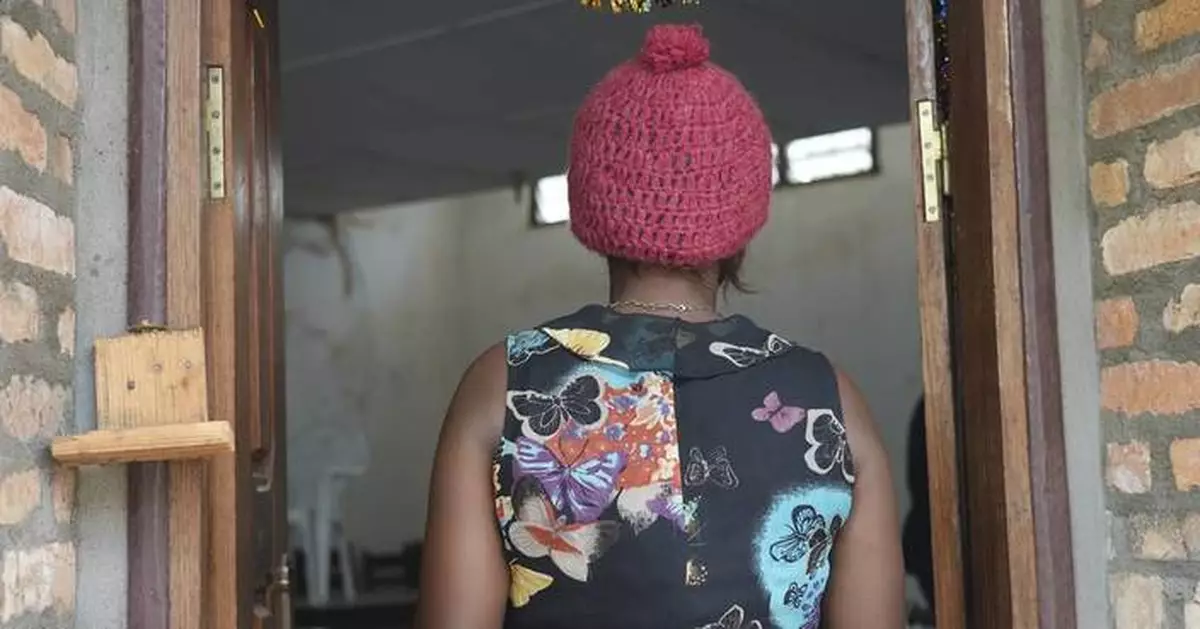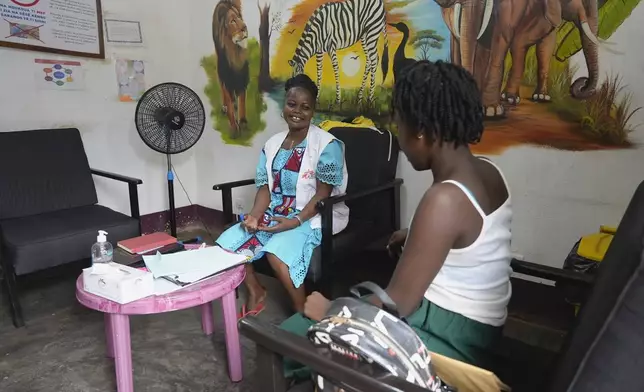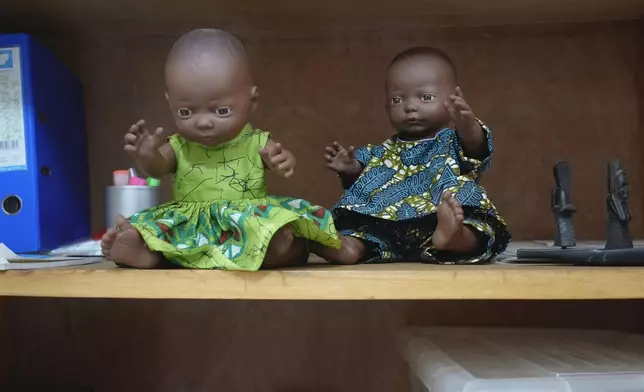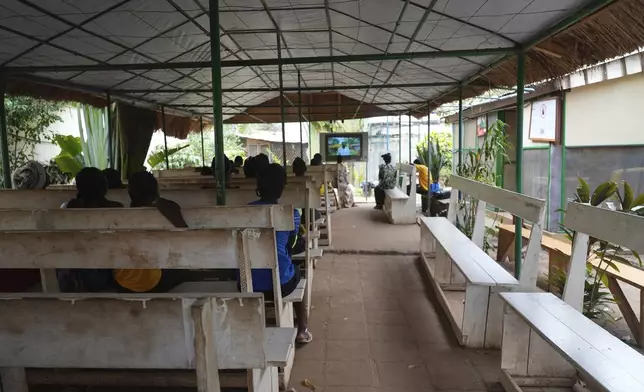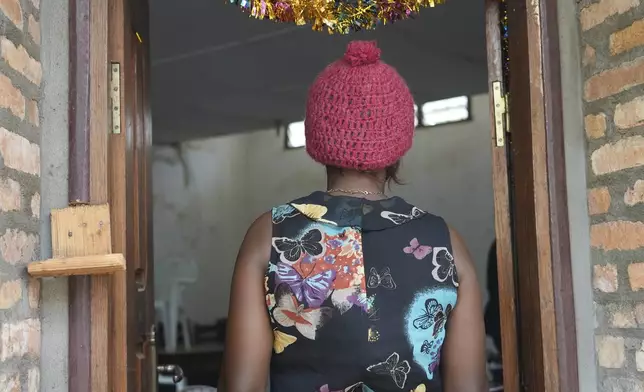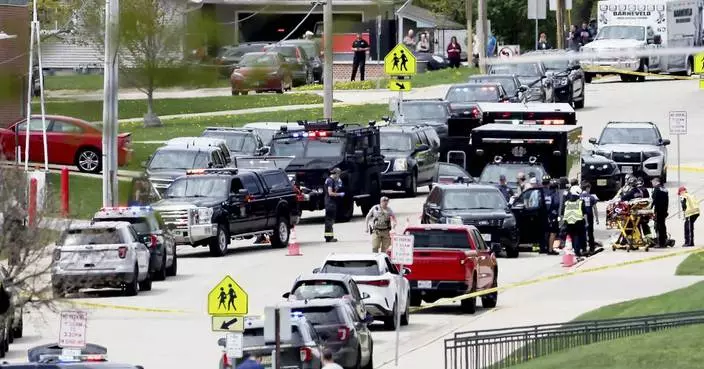BANGUI, Central African Republic (AP) — It was too late for the mother to shield her children when the two masked and armed Russian fighters burst into her home, held her at gunpoint and took turns raping her. Her five children were forced to watch in the dark.
Seated in a restaurant in Central African Republic’s capital, where she has since fled, she wiped away tears. Two years on, the assault has "stayed with me in my core,” she said. The Associated Press does not identify survivors of sexual assault.
Click to Gallery
BANGUI, Central African Republic (AP) — It was too late for the mother to shield her children when the two masked and armed Russian fighters burst into her home, held her at gunpoint and took turns raping her. Her five children were forced to watch in the dark.
Dolls sit on a shelf in a room in a Doctors Without Borders Clinic in Bangui, Central African Republic, Monday, March 11, 2024. The dolls are used as props to help health professionals work with young children who have been sexually assaulted. Sexual assaults and other cases of gender-based violence are rising in Central African Republic. The alleged attackers include everyone from Wagner mercenaries to bandits to United Nations peacekeepers. Reasons include ongoing conflict in one of the world's most volatile countries, a weak legal system and the stigma of speaking up. (AP Photo/Sam Mednick)
A Doctors Without Borders clinic staff, left, provides support for a woman who has been sexually assaulted in Bangui, Central African Republic, Monday, March 11, 2024. She said she was sexually assaulted by a United Nations peacekeeper in November while on the night shift. Sexual assaults and other cases of gender-based violence are rising in Central African Republic. The alleged attackers include everyone from Wagner mercenaries to bandits to United Nations peacekeepers. Reasons include ongoing conflict in one of the world's most volatile countries, a weak legal system and the stigma of speaking up. (AP Photo/Sam Mednick)
Women gather at a Doctors Without Borders clinic that provides support for people who have been sexually assaulted in Bangui, Central African Republic, Monday, March 11, 2024. Sexual assaults and other cases of gender-based violence are rising in Central African Republic. The alleged attackers include everyone from Wagner mercenaries to bandits to United Nations peacekeepers. Reasons include ongoing conflict in one of the world's most volatile countries, a weak legal system and the stigma of speaking up. (AP Photo/Sam Mednick)
A 39-year-old security guard stands on the doorway at a clinic in Bangui, Central African Republic, Monday, March 11, 2024. She said she was sexually assaulted by a United Nations peacekeeper in November while on the night shift. Sexual assaults and other cases of gender-based violence are rising in Central African Republic. The alleged attackers include everyone from Wagner mercenaries to bandits to United Nations peacekeepers. Reasons include ongoing conflict in one of the world's most volatile countries, a weak legal system and the stigma of speaking up. (AP Photo/Sam Mednick)
She blamed the Russians who are part of the Wagner mercenary group that operates alongside Central African Republic's army and has been accused by locals and rights groups of abuses. She had seen them patrolling in her town of Bambari before. On the day of the assault, they were fighting rebels there.
Gender-based violence is rising in Central African Republic amid ongoing conflict, weak legal and care systems and the stigma of speaking up, locals and aid groups say.
Since 2020, incidents have jumped from about 9,200 reported cases to 25,500, according to cases tracked by the U.N. and partners.
But international funding for the country has dropped, with gender-based violence receiving some of the least support. The humanitarian request for about $14 million received less than 15% of that, according to the U.N.
Central African Republic has been in conflict since 2013, when predominantly Muslim rebels seized power and forced the president from office. Mostly Christian militias fought back. A 2019 peace deal only lessened the fighting, and six of the 14 armed groups that signed later left the agreement.
Wagner, a U.N. peacekeeping mission and Rwandan troops are all on the ground to try to quell the violence.
“More than 10 years on since this crisis unfolded, many people are still displaced, vulnerable and live at the mercy of armed groups," said Lewis Mudge, Central Africa director for Human Rights Watch. “A new dynamic has emerged as well whereby mercenaries aligned with the government are also, at times, preying on the local population.”
Doctors Without Borders, one of the main organizations working on gender-based violence, says it has seen an increase in patients due to the expansion of services and outreach. But it says the majority of survivors likely don’t come forward, often because help is not available where they live.
The 37-year-old who fled to the capital, Bangui, said she received mental health treatment and assistance for her children from an international aid group. She's too afraid to return home and survives by selling charcoal in the market and on handouts from friends. She never reported the attack to police because she thought it was futile.
“Who can arrest the Russians in this country?” she asked.
A local fighter who works with Wagner asserted that he saw six of the Russians rape a local woman in the tent where he was sleeping at their base in Bambari in early 2023. He said the Russians give women canned food like sardines or bottled water afterward. He spoke on condition of anonymity for fear of reprisal.
The Russian government didn’t respond to questions.
Women don’t usually blame Wagner because its fighters are so entrenched in communities that they fear retaliation, aid groups said. During a visit by The Associated Press in March, Russians could be seen driving trucks around Bangui and walking in the western town of Bouar.
Women who come forward find it hard to receive justice, said Lucie Boalo Mbassinga, vice president of the Association For Women Lawyers for Central Africa. She said they had 213 cases of sexual assault and rape reported in 2022 and 304 cases in 2023. Sometimes women open a case against local fighters but withdraw it because perpetrators' families pay survivors not to proceed, she said.
The challenges are compounded by funding cuts.
In November, Mbassinga's organization closed a program that was helping survivors across eight provinces, including in the capital, because there was no more money, she said. The cuts by the U.N. Development Program have prevented staff from reaching women in more rural areas, accompanying them to court and providing medical and mental health support, she said.
“Victims are abandoned,” Mbassinga said. She suggested having mobile courts to better reach rural areas.
Donor fatigue and multiple global crises are part of the reason for cuts in funding, but some diplomats and aid workers say the presence of Wagner mercenaries embedded so closely with the government and in communities makes it hard to justify giving aid. There are concerns that funding could be associated with Wagner.
But not only Wagner fighters are accused of rape.
The AP spoke with three women who said they had been sexually assaulted. One blamed Wagner. One blamed an armed bandit. One, a security guard, blamed a U.N. peacekeeper.
The 39-year-old security guard said she was assaulted in November while on the night shift in Bangui at the peacekeeper's home. He left her about $65 when it was over, she said.
She asked her supervisor to be transferred to another house but never reported the attack. Her pastor cautioned against it to keep her job.
The U.N. mission didn't receive any allegation of sexual assault involving its personnel last November, spokesman Vladimir Monteiro said, and stressed that the U.N. takes such allegations seriously.
The U.N. has long wrestled with allegations of sexual assaults by U.N. peacekeepers in Central African Republic and elsewhere. Three years ago, the secretary-general ordered the immediate repatriation of the entire U.N. Gabonese peacekeeping contingent following credible reports of sexual abuse.
The government's justice ministry didn't respond to requests for comment. The new constitution has measures to tackle the issue, saying authorities must ensure that sexual assault is eliminated.
But that comes as little comfort for survivors.
In December, a 29-year-old woman said she was assaulted at a market about 124 miles (200 kilometers) from Bangui. Three men with knives and machetes robbed her and one raped her.
She didn’t report it because she didn’t know the man and thought police would refuse to investigate.
Now the mother of two wants to move on. She finds comfort in a program run by Doctors Without Borders, meeting weekly with a dozen other survivors.
“The advice I’ve been given is not think about the aggressor and to stay busy,” she said.
The Associated Press receives financial support for global health and development coverage in Africa from the Bill & Melinda Gates Foundation Trust. The AP is solely responsible for all content. Find AP’s standards for working with philanthropies, a list of supporters and funded coverage areas at AP.org.

A Doctors Without Borders clinic staff, left, provides support for a woman who has been sexually assaulted in Bangui, Central African Republic, Monday, March 11, 2024. Sexual assaults and other cases of gender-based violence are rising in Central African Republic. The alleged attackers include everyone from Wagner mercenaries to bandits to United Nations peacekeepers. Reasons include ongoing conflict in one of the world's most volatile countries, a weak legal system and the stigma of speaking up. (AP Photo/Sam Mednick)

Dolls sit on a shelf in a room in a Doctors Without Borders Clinic in Bangui, Central African Republic, Monday, March 11, 2024. The dolls are used as props to help health professionals work with young children who have been sexually assaulted. Sexual assaults and other cases of gender-based violence are rising in Central African Republic. The alleged attackers include everyone from Wagner mercenaries to bandits to United Nations peacekeepers. Reasons include ongoing conflict in one of the world's most volatile countries, a weak legal system and the stigma of speaking up. (AP Photo/Sam Mednick)
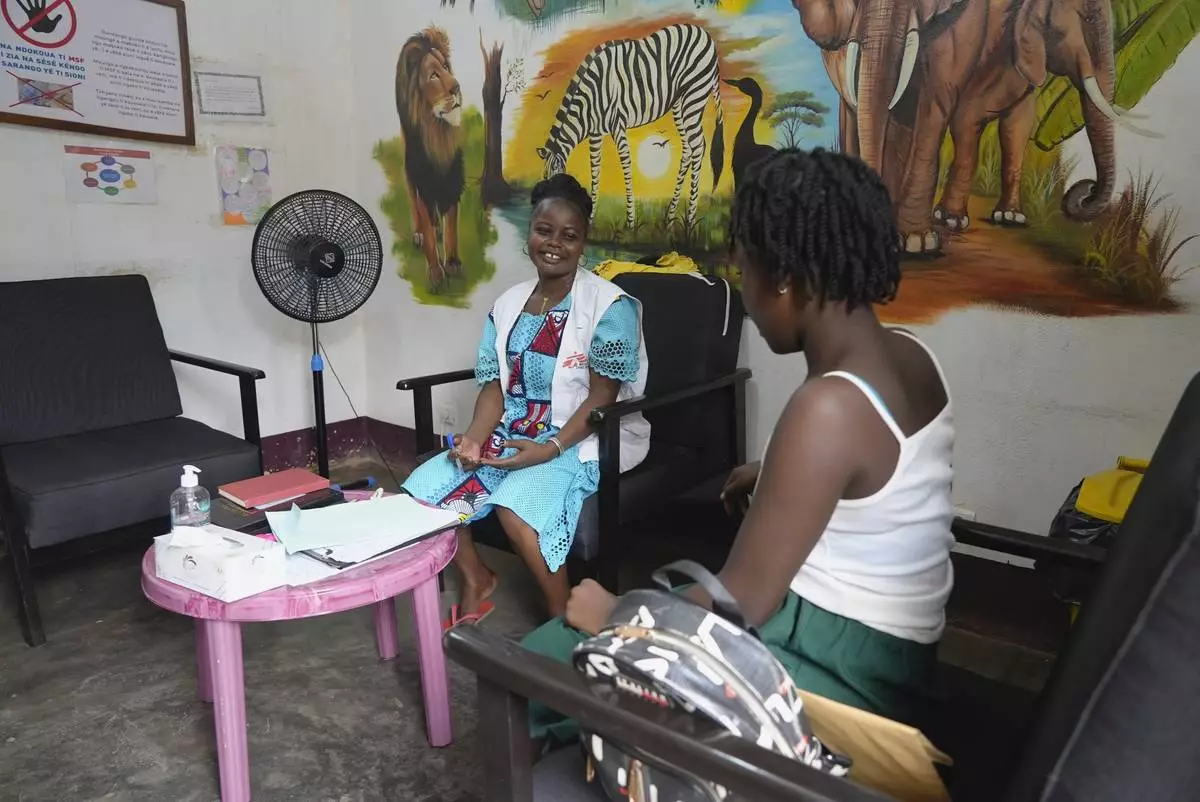
A Doctors Without Borders clinic staff, left, provides support for a woman who has been sexually assaulted in Bangui, Central African Republic, Monday, March 11, 2024. She said she was sexually assaulted by a United Nations peacekeeper in November while on the night shift. Sexual assaults and other cases of gender-based violence are rising in Central African Republic. The alleged attackers include everyone from Wagner mercenaries to bandits to United Nations peacekeepers. Reasons include ongoing conflict in one of the world's most volatile countries, a weak legal system and the stigma of speaking up. (AP Photo/Sam Mednick)

Women gather at a Doctors Without Borders clinic that provides support for people who have been sexually assaulted in Bangui, Central African Republic, Monday, March 11, 2024. Sexual assaults and other cases of gender-based violence are rising in Central African Republic. The alleged attackers include everyone from Wagner mercenaries to bandits to United Nations peacekeepers. Reasons include ongoing conflict in one of the world's most volatile countries, a weak legal system and the stigma of speaking up. (AP Photo/Sam Mednick)

A 39-year-old security guard stands on the doorway at a clinic in Bangui, Central African Republic, Monday, March 11, 2024. She said she was sexually assaulted by a United Nations peacekeeper in November while on the night shift. Sexual assaults and other cases of gender-based violence are rising in Central African Republic. The alleged attackers include everyone from Wagner mercenaries to bandits to United Nations peacekeepers. Reasons include ongoing conflict in one of the world's most volatile countries, a weak legal system and the stigma of speaking up. (AP Photo/Sam Mednick)
WASHINGTON (AP) — The last thing standing between Ashnaelle Bijoux and her college dream is the FAFSA form — a financial aid application that's supposed to help students go to college, but is blocking her instead. She has tried to submit it over and over. Every time, it fails to go through.
“I feel overwhelmed and stressed out,” said Bijoux, 19. She came close to tears the last time she tried the form. “I feel like I'm being held back."
Normally a time of celebration for high school seniors, this spring has been marred by the federal government's botched rollout of the new FAFSA application. By May 1, students usually know where they're headed to college in the fall. This year, most still haven't received financial aid offers. Three months before the start of fall classes, many don't know where they're going to college, or how they're going to pay for it.
“We’re asking them to make probably one of the biggest financial decisions — and decisions that will have the biggest implications on their lives going forward — without all of the information,” said Justin Draeger, president and CEO of the National Association of Student Financial Aid Administrators.
The FAFSA, or Free Application for Federal Student Aid, went through a massive overhaul that was supposed to make it simpler and shorter. But a series of blunders by the Education Department made it harder than ever, delaying college decisions by months and raising fears that hundreds of thousands of students will forgo college entirely.
Across the United States, the number of students who have successfully submitted the FAFSA is down 29% from this time last year, and it’s even worse at schools with more low-income students, according to the National College Attainment Network.
The group's CEO, Kim Cook, warned members of Congress this month about a potentially “catastrophic” drop in college enrollments that would make the decreases of the pandemic seem mild.
For Bijoux, of Norwich, Connecticut, the FAFSA problems threaten to undermine the promise of higher education.
To her, college is a chance to seize the opportunities that weren't available to her mother, who immigrated from Haiti to the U.S. as an adult. Bijoux hopes to become a therapist and set a positive example for her three younger brothers.
If her FAFSA goes through, she should be eligible for enough financial aid to help with the $ 13,000-a-year tuition at Southern Connecticut State University. If not, she might go to a local community college, but even that would require loans if she can't complete the FAFSA.
“That’s why it hurts, because it’s like you work so hard to go somewhere and do something and make something of yourself,” Bijoux said. “I thought I would start at a four-year (college) and then work hard continuously, like I’ve been doing basically my whole life. But that’s not the case.”
The updated FAFSA form has one section filled out by students and another by their parents. But when Bijoux finishes her part, nothing shows up on her mom's online account. She keeps trying, but nothing seems to change.
Similar problems have been reported across the country, along with numerous other bugs that the Education Department has scrambled to fix. Families who call for customer service have faced long wait times or say the call center hung up on them.
It “drains all the momentum” from families working to send their children to college, especially those navigating the process for the first time, said Anne Zinn, a counselor at Norwich Free Academy, where Bijoux goes to school.
“I can only say so many times, ‘Just be patient, just be patient,’ before they throw their hands up and they’re like, ‘Why am I doing this? I’m just gonna go get a job,'" she said.
The rollout has attracted bipartisan criticism in Congress, and it's being investigated at the request of Republicans. Last week, Richard Cordray, the federal student loan chief who oversaw the FAFSA update, announced he's stepping down at the end of June.
For colleges, too, the delays pose a major threat.
Enrollment decreases like those being projected now could put many small colleges out of business, or necessitate deep cuts in staff. Some colleges are pushing for emergency relief just to stay afloat, said Angel Pérez, CEO of the National Association for College Admission Counseling.
“If they don’t get checks from the federal government to basically get them through next year, they will not survive,” Pérez said.
The FAFSA has been the linchpin of student financial aid for decades. It's used to determine eligibility for the federal Pell grant, a scholarship for low-income students, and it's required to receive federal student loans. Colleges and states also use FAFSA to distribute their own scholarships.
FAFSA had long been maligned for being tedious, difficult and intimidating to families without college experience. Congress passed legislation in 2020 meant to simplify the form. The Education Department was ordered to reduce the number of questions from more than 100 to about 40, and change the formula to expand aid to more students.
Problems started piling up as soon as the new form went online in December, already months overdue.
The first applications were incorrectly processed using an outdated calculation for inflation. Later, a federal contractor miscalculated a different formula on more than 200,000 applications. Each mistake added to delays, leaving students waiting longer to hear anything about financial aid.
Even more worrisome is a misstep that blocked students from finishing the form if they have a parent without a Social Security number. Advocates say the system locked out hundreds of thousands of students who are U.S. citizens or permanent residents but whose parents are not.
The Education Department on Tuesday said it's giving those parents a new way to enter their tax information manually. But as recently as this week, some students said they were still blocked from submitting the form.
Federal education officials say they're addressing lingering bugs but making progress. More than 8 million student applications have now been processed and sent to colleges, the agency said, and new applications are being processed within three days.
Still, the wait is far from over. It usually takes weeks for schools to prepare financial aid offers. Some colleges have extended decision deadlines to give students more time to weigh their options. But some stuck to May 1, forcing students to choose a college — and make a nonrefundable payment to hold their spot — without knowing all their scholarship options.
In West Virginia, Gov. Jim Justice on Tuesday declared a state of emergency that allows students to receive state scholarships without having their FAFSA processed by the federal government. West Virginia has the lowest number of college graduates in the nation, and the state’s high school FAFSA completion rates are currently down nearly 40%, said Justice, a Republican.
"Really and truly, a lot of kids are sitting on the sidelines ... wondering, ‘Am I going to be able to go to college?’ ” he said during a news briefing.
In Baltimore, Camryn Carter is waiting to find out if he'll get a full ride to the University of Maryland or face tens of thousands of dollars in student loans.
A top student and captain of his baseball and wrestling teams, Carter sees college as a step up in life. He thinks back to the times in the grocery store line when he had to put items back on the shelf because his mom couldn't afford the bill. A college degree would give him the stability he didn't always have, the 18-year-old said.
But when he looks at tuition, it's intimidating. Along with Maryland, he's also considering McDaniel College, a private school in Maryland. If he enrolls there, he expects to borrow almost $30,000 a year.
“I try to make the best decisions now so I can have a good future,” he said. “I'm a little nervous that things won't work out. But I'm faithful.”
__
Leah Willingham contributed reporting from Charleston, West Virginia.
__
The Associated Press’ education coverage receives financial support from multiple private foundations. AP is solely responsible for all content. Find AP’s standards for working with philanthropies, a list of supporters and funded coverage areas at AP.org.

Ashnaelle Bijoux poses on campus, Saturday, April 27, 2024, at Norwich Free Academy in Norwich, Conn. Bijoux, a senior at NFA, has been unable to complete the FAFSA form due to a glitch with the form. Without the form and the financial aid it brings, Bijoux won't be able to pursue her goal of going to Southern Connecticut State University to become a therapist. (AP Photo/Jessica Hill)

Ashnaelle Bijoux poses on campus, Saturday, April 27, 2024, at Norwich Free Academy in Norwich, Conn. Bijoux, a senior at NFA, has been unable to complete the FAFSA form due to a glitch with the form. Without the form and the financial aid it brings, Bijoux won't be able to pursue her goal of going to Southern Connecticut State University to become a therapist. (AP Photo/Jessica Hill)

Ashnaelle Bijoux poses on campus, Saturday, April 27, 2024, at Norwich Free Academy in Norwich, Conn. Bijoux, a senior at NFA, has been unable to complete the FAFSA form due to a glitch with the form. Without the form and the financial aid it brings, Bijoux won't be able to pursue her goal of going to Southern Connecticut State University to become a therapist. (AP Photo/Jessica Hill)

Ashnaelle Bijoux poses on campus, Saturday, April 27, 2024, at Norwich Free Academy in Norwich, Conn. Bijoux, a senior at NFA, has been unable to complete the FAFSA form due to a glitch with the form. Without the form and the financial aid it brings, Bijoux won't be able to pursue her goal of going to Southern Connecticut State University to become a therapist. (AP Photo/Jessica Hill)







